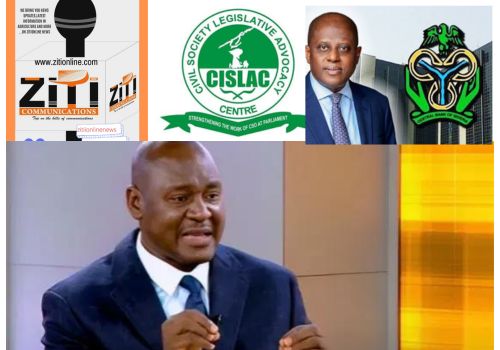By Queen Kunde
Civil Society Legislative Advocacy Centre (CISLAC) has strongly condemned the recent extravagant spending by the leadership of the Central Bank of Nigeria (CBN), including its governor, Yemi Cardoso, and his four deputies while Nigeria continues to struggle with hunger, hardship, and rising inflation.
This was contained in statement signed by the Executive Director Civil Society Legislative Advocacy Centre (CISLAC)/Transparency International Nigeria, Auwal Musa Rafsanjani which revealed that the organization is renewing its call for urgent measures to reduce the high cost of governance and ensure greater accountability in government operations.
According to him, “Reports have surfaced that Mr. Cardoso and his deputies, who were nominated and confirmed by the Senate in September 2023, have spent over N10 billion on ultra-modern armored vehicles. According to sources, Mr. Cardoso recently procured six armored Lexus LX 600 2023 models for himself and his deputies—Emem Usoro, Philip Ikeazor, Bala Bello, and Sani Abdullah”
Insiders revealed that Mr. Cardoso personally acquired two SUVs to be used in Lagos and Abuja, despite already having armored vehicles in their convoy.
Additionally, it has been alleged that Mr. Cardoso purchased about 20 new Toyota Camry cars at the rate of N85 million each for CBN management and board members.
Further reports indicate that the governor and his deputies have significantly increased their annual housing allowances to nearly N1 billion, despite residing in official palatial residences in Maitama, Abuja.
\
“In light of these revelations, we express deep concern over the government’s continued extravagant spending amidst the country’s economic challenges.
Auwal Musa Rafsanjani emphasized that such expenditures are irresponsible, particularly when the nation faces severe socio-economic difficulties, including rising poverty, growing insecurity, a failing healthcare system, and an underfunded educational sector.
“We must hold ourselves accountable and take responsibility for the betterment of our nation,” Rafsanjani stated. “It is crucial that our government operates efficiently and effectively, serving the needs of the people and fostering sustainable development.”
CISLAC stressed that reducing unnecessary spending is essential for effectively allocating resources. “We need to cut down on ostentatious living and excessive spending by our officials”
“This will enable us to redirect funds towards creating value and investing in infrastructure and capital projects that can significantly improve the lives of Nigerians.”
The statement says CISLAC is particularly concerned about the ongoing practice of allocating public funds for the purchase of expensive and luxurious vehicles for ministries and parastatals. The organization highlighted that this practice merely serves the comfort and extravagance of a few officials, rather than fulfilling any justified operational need.
CISLAC reiterated that public service should not be an avenue for showcasing wealth or engaging in competitions of affluence, but rather a position of honor and responsibility.
While CISLAC does not oppose individual public officials using their legitimate private resources to acquire luxury vehicles, it strongly condemns the use of public funds for such purposes.
The organization argued that being in public service should be synonymous with integrity and honor, not an opportunity for indulging in excessive comfort and luxury. The recent actions by the CBN leadership, where ultra-modern armored vehicles were purchased, mirror similar patterns seen within the executive and legislative branches of government. This has contributed to the proliferation of convoys for ministers and governors, a practice that CISLAC deems wasteful and detrimental to the economy.
The extravagant spending on luxury vehicles and other non-essential items has put undue pressure on the nation’s economy, especially at a time when many Nigerians are grappling with hunger, poor infrastructure, and insecurity.
CISLAC insists that public officials must be mindful of the resources they manage and prioritize public accountability and the judicious use of public funds. The organization’s concern is further compounded by the fact that such expenses are repeatedly included in the budget year after year, leading to persistent financial strain on the country.
CISLAC therefore calls for a return to the practices of the Murtala administration, where public officials used a standard type and uniform cars, emphasizing that such measures promoted frugality and discipline.
Particularly, CISLAC advocates for the promotion of locally made and assembled vehicles, arguing that this would not only boost the economy but also reduce the dependency on imported high-end cars. The organization also raised concerns about the lack of due process in these purchases, noting that many of them come with inflated figures, exacerbating the already dire economic situation.
Reflecting on past efforts, CISLAC noted that in 2012, the organization held a conference addressing the high cost of governance, where actionable measures were recommended to tackle the issue. However, these recommendations have largely been ignored by both state and federal governments, leading to the current situation of unchecked spending and financial mismanagement.
CISLAC also highlighted the importance of investing in human capital, urged government to empower public officials with the necessary skills and knowledge to drive progress also called for a culture of innovation and creativity in governance, where new ideas can flourish and contribute to national transformation.
In light of these concerns, CISLAC will continue to provide support to National and State Assemblies to ensure that budget appropriations are adequately scrutinized to remove duplication, waste, and outright diversion of public funds, the statement reiterated.
CISLAC also emphasized that public funds should be judiciously used to address the country’s most pressing needs, rather than being squandered on lavish lifestyles and unnecessary expenditures.
